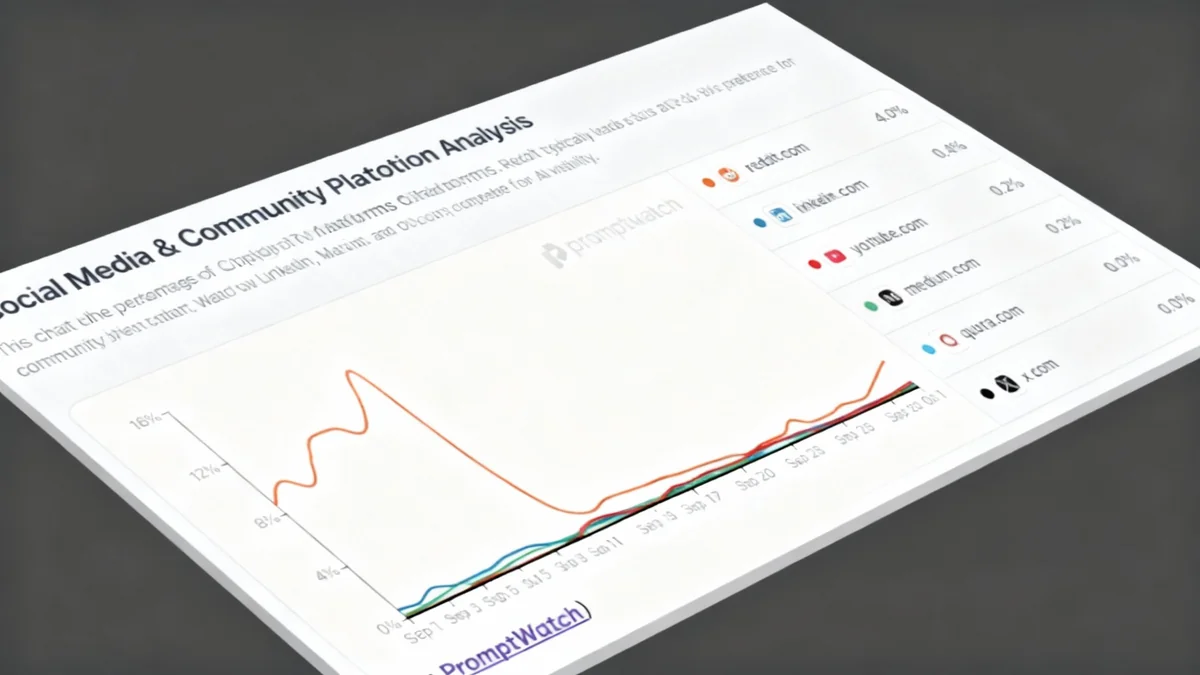The landscape of online property discovery has been fundamentally altered in a matter of weeks, driven by two major changes within OpenAI's ChatGPT. The platform has significantly reduced its reliance on crowdsourced content from Reddit while simultaneously integrating Zillow as its exclusive real estate partner, creating new challenges and opportunities for industry professionals.
These developments signal a clear trend in artificial intelligence: a move towards authoritative, verifiable data and consolidation within powerful platform ecosystems. For real estate agents, the strategies that worked just last month for online visibility may now be obsolete.
Key Takeaways
- ChatGPT has drastically cut its use of Reddit for information, with citations dropping by over 80% in a short period.
- The AI now heavily favors authoritative sources like Wikipedia, which accounts for nearly half of its top citations.
- Zillow has become the exclusive real estate application within ChatGPT, giving it direct access to the platform's 800 million weekly users.
- This shift requires real estate professionals to pivot from community forums to building credibility through established media and original research.
The End of an Era for Crowdsourced Influence
A significant change in how ChatGPT gathers information has quietly unfolded. In early October, content from Reddit was found in just 2% of the AI's responses, a sharp decline from 9.7% the previous month. At its peak in September, Reddit content was cited in over 14% of answers, marking a swift and decisive pivot away from the popular forum.
The reasoning behind this change points to a broader strategy by AI developers to enhance reliability. OpenAI is actively prioritizing sources that are more structured and verifiable over the often-unpredictable nature of crowdsourced conversations. Platforms like Reddit, while valuable for community discussion, can also be sources of misinformation and low-quality content.
A Pivot to Authority
The move away from user-generated forums is part of an effort to improve the accuracy and trustworthiness of AI-generated answers. Systems are being trained to favor content with editorial oversight, fact-checking processes, and clear accountability, which are hallmarks of established institutions but absent from open forums.
Wikipedia and Media Gain Ground
As Reddit's influence has waned, other sources have risen to fill the void. Wikipedia now accounts for a staggering 47.9% of ChatGPT's top citations, making it the dominant source of information for the system. This highlights the AI's preference for structured, encyclopedic knowledge.
Following Wikipedia, established media outlets, academic journals, and institutional websites are also seeing increased prominence. This pattern underscores a clear strategic direction: AI is being taught to trust institutional credibility over popular opinion. For real estate professionals who invested time building a presence in Reddit communities, this means that strategy will now yield diminishing returns in terms of AI-driven client discovery.
Zillow's Exclusive Integration with ChatGPT
Just days after the data on Reddit's decline became apparent, another major development occurred. Zillow announced it had become the first and only real estate application integrated directly into ChatGPT. This move effectively consolidates a massive new channel for property searches.
With this integration, ChatGPT's more than 800 million weekly users can now search for homes conversationally without leaving the AI interface. A user can ask, "Show me three-bedroom homes near downtown with a large backyard," and the Zillow plugin will surface relevant listings complete with photos, pricing, and maps. Each result links directly back to Zillow's platform, where users can connect with agents or explore financing.
A New Search Paradigm
This partnership transforms property discovery from a keyword-based search on a portal to a conversational query with an AI assistant. It represents a significant evolution in how potential buyers may begin their home search, shifting the initial point of contact away from traditional search engines and real estate websites.
This integration creates a powerful network effect. As more buyers use ChatGPT for initial research, the value of being visible on the integrated platform—in this case, Zillow—grows exponentially. Agents not affiliated with Zillow may find themselves excluded from a rapidly growing discovery channel where millions of potential clients are starting their journey.
Some industry observers have raised questions about whether this integration complies with existing MLS data agreements, as listing data is being surfaced on a third-party platform (OpenAI) rather than a Zillow-owned property. The resolution of these questions could shape how other platforms and MLS organizations approach AI integrations in the future.
Four Strategic Priorities for Real Estate Professionals
These two developments, occurring within the same week, point to a single, unified trend: AI is prioritizing authority and consolidating user experiences. Adapting to this new reality is no longer optional. Here are four strategic priorities for real estate professionals moving forward.
1. Build Authority on Platforms AI Trusts
The focus must shift from participating in forums to creating authoritative content. This includes:
- Building relationships with local journalists. Getting quoted as an expert source in a news article creates the type of verifiable citation that AI systems value.
- Contributing to established publications. Writing articles for reputable real estate news sites or local business journals builds recognized credibility.
- Creating original research. Publishing unique market reports or data analysis establishes you as a primary source worth citing.
- Ensuring accuracy on platforms like Wikipedia. Contributing to and correcting information about your local market can indirectly position your cited work in front of AI systems.
2. Emphasize Human Expertise
As AI handles more of the initial property discovery, a professional's value shifts to what comes next. Technology cannot replicate the nuance of human interaction and expertise. Focus on skills that are irreplaceable:
"Your value lies in what happens after discovery: interpretation of data for specific situations, guidance through complex decisions requiring experience and judgment, negotiation drawing on reading people and situations, and emotional support through stressful processes."
Promote your ability to provide personalized guidance, expert negotiation, and advocacy—qualities that an algorithm cannot offer.
3. Own Your Client Relationships
Platform rules and algorithms can change overnight, as these recent events demonstrate. It is crucial to build direct lines of communication with your network that are not dependent on any single third-party platform. An email newsletter, a personal blog, or a community group can provide a stable foundation for client relationships that you control.
4. Stay Informed and Adapt Quickly
The pace of technological change is accelerating. The events of the past few weeks are a clear indicator that the digital landscape can be redrawn almost instantly. Staying current requires a commitment to continuous learning, whether through industry associations, professional networks, or peer groups. Those who understand these shifts and adapt their strategies will gain visibility, while those who do not risk becoming invisible to the next generation of homebuyers.





